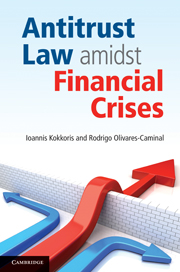Book contents
- Frontmatter
- Contents
- Foreword by Philip Lowe
- Foreword by Frederic Jenny
- Preface
- Table of cases
- Table of treaties and other international instruments
- Introduction
- 1 Introduction to competition law: EU, US and UK
- 2 Some notes on crises
- 3 Failing-firm defence
- 4 Efficiencies
- 5 Crisis cartels
- 6 State aid (Phedon Nicolaides)
- 7 Competition enforcement in periods of crisis
- 8 Conclusion
- Index
Introduction
- Frontmatter
- Contents
- Foreword by Philip Lowe
- Foreword by Frederic Jenny
- Preface
- Table of cases
- Table of treaties and other international instruments
- Introduction
- 1 Introduction to competition law: EU, US and UK
- 2 Some notes on crises
- 3 Failing-firm defence
- 4 Efficiencies
- 5 Crisis cartels
- 6 State aid (Phedon Nicolaides)
- 7 Competition enforcement in periods of crisis
- 8 Conclusion
- Index
Summary
As freak legislation, the antitrust laws stand alone. Nobody knows what it is they forbid.
Isabelle Paterson (1866–1961)As result of the recent crisis it has been argued that competition policy may be set aside due to special and exceptional circumstances. These special and exceptional circumstances can be, inter alia, the collapse of a bank that can trigger a systemic crisis. Therefore it is important to have a clear understanding of the rules (i.e. competition law) and the exceptions to those rules, especially in the presence of such exceptional circumstances. In addition, it is important for distressed entities and policy-makers to understand clearly the array of options that they have in advance since these can be used as part of their ‘crisis toolkit’. The aim of this book is to provide an analysis of such exceptions to competition law and policy, particularly in the context of a financial crisis.
Promotion of consumer welfare has traditionally been considered one of the aims, not the sole aim, of antitrust, both in the United States and in Europe. In the United States of America the Federal Trade Commission (FTC) acts to ensure that markets operate efficiently to benefit consumers. In the United Kingdom the Office of Fair Trading (OFT) declares that the its goal is to make markets work well for consumers. Most academics seem to agree that consumer protection is the prevailing aim of antitrust legislation.
- Type
- Chapter
- Information
- Antitrust Law amidst Financial Crises , pp. 1 - 13Publisher: Cambridge University PressPrint publication year: 2010

